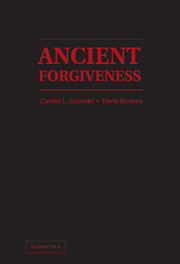Book contents
- Frontmatter
- Contents
- Contributors
- Preface
- Part I The Territory Philosophically Considered
- II Forgiveness Among The Greeks
- Part III Forgiveness Among The Romans
- Part IV Judaic And Christian Forgiveness
- 8 Mercy, Repentance, and Forgiveness in Ancient Judaism
- 9 A Man Had Two Sons
- 10 Jesus’ Conditional Forgiveness
- 11 Forgiveness in Patristic Philosophy
- 12 Forgiveness and Perfection
- Bibliography of Works Cited
- Index
- References
9 - A Man Had Two Sons
The Question of Forgiveness in Luke 15
from Part IV - Judaic And Christian Forgiveness
Published online by Cambridge University Press: 05 January 2012
- Frontmatter
- Contents
- Contributors
- Preface
- Part I The Territory Philosophically Considered
- II Forgiveness Among The Greeks
- Part III Forgiveness Among The Romans
- Part IV Judaic And Christian Forgiveness
- 8 Mercy, Repentance, and Forgiveness in Ancient Judaism
- 9 A Man Had Two Sons
- 10 Jesus’ Conditional Forgiveness
- 11 Forgiveness in Patristic Philosophy
- 12 Forgiveness and Perfection
- Bibliography of Works Cited
- Index
- References
Summary
Coventry’s Cathedral of St. Michael was destroyed in a German air raid on the night of November 14, 1940. All that remained of the late medieval structure was the church’s tower, its Gothic spire, and a portion of the apse. Only two decades after the bombing an imposing modern cathedral was built on the site – but not at the expense of the “bare ruined choir” left standing in the open air. The ruins remain, and to enter the new building you must pass by the shattered skeleton of the old. Your eye is caught there by an altar constructed out of medieval rubble standing at the center of the former apse. On it is a cross of two burned oak beams; behind it, engraved in gold into the sandstone of the wall, a fragmentary text: father forgive.
These words come from Luke’s account of the crucifixion, where Jesus responds to the jeers of the crowd by pleading, “Father, forgive them, for they do not know what they are doing” (23:34). The rebuilders of Coventry effectively took father forgive as the new cathedral’s motto. The phrase also became the impetus for an international ministry of reconciliation forged initially between Britain and Germany, and now shared more widely. On site, the engraved words are provocative. The ruins and the charred cross refuse to let the past slip away unnoticed. The destruction has not been erased, and if there is forgiveness, there will be no forgetting, no pretense that the Axis pilots did not release thousands of bombs on a terrifying night in 1940. Yet the handwriting on the wall does not ask the Father (or anyone else) to forgive “them” in particular. Nor does it exonerate “us,” for the open call to forgive means remembering not only the Axis enemy that started it all but also the lethal Allied attacks on the civilians of Dresden and Hamburg, not to mention the American atom bombs that devastated Hiroshima and Nagasaki. With disasters like these on both sides of the wartime divide, it becomes difficult to settle a score or even keep track of one. In the spirit of Coventry, then, there may be nothing more to do in the face of such catastrophic circumstances than to recall the agonized Christ’s call for a mercy that, in this two-word iteration, is open-ended, making no issue of “them” or “us.” Perhaps in the wreckage of the twentieth century, with enough blame to go around, the last word should simply be forgive.
- Type
- Chapter
- Information
- Ancient ForgivenessClassical, Judaic, and Christian, pp. 158 - 175Publisher: Cambridge University PressPrint publication year: 2011

